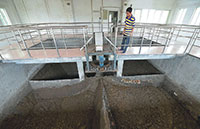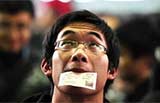Trade union target for foreign firms 'on track'
By Chen Xin in Shenyang (China Daily) Updated: 2012-07-23 03:44Federation should meet 95-percent representation goal by 2013: official
The target of trade union representation in 95 percent of overseas-funded enterprises by 2013 is on course to be met, a senior union official said.
Of the approximately 180,000 overseas-funded corporations in China, 81.2 percent have established unions, said Wang Ying, a senior official with the All-China Federation of Trade Unions, the top union organization.
"It is a priority to have greater union presence in overseas-funded enterprises," Wang told China Daily.
The federation set a target in 2011 for 95-percent representation in overseas-invested enterprises with more than 10 employees.
Even though the target should be met, the federation will continue to push for union representation, as challenges still exist, she said.
Some overseas-funded enterprises believe that they do not need unions as they already have a sufficient wage and welfare distribution system with adequate labor protection, she said.
"But workers often tell us that employers are falling short in these areas."
Some companies try to delay or get around the establishment of a union by citing opposition from headquarters in the home country.
"But overseas-funded enterprises should operate according to Chinese law and regulations," Wang said.
"And they should understand that Chinese unions are obliged to boost the corporation's development, maintain sound labor relations and protect workers' legitimate rights."
Wang said all Wal-Mart and Kentucky Fried Chicken outlets in China have established trade unions and they set a good example for other overseas companies.
China's Trade Union Law stipulates that the primary task of a union is to boost collective contract agreements and to mediate labor relations through negotiation between employees and employer.
The federation plans to introduce collective wage negotiation in 80 percent of corporations that have unions by 2013, and all Fortune 500 companies operating in China will be asked to carry out collective talks by that time, according to their three-year plan.
"Thanks to a greater presence of unions in overseas-funded companies, and with more of them holding collective negotiations, labor disputes in those enterprises have been decreasing," Wang said.
"Chinese unions do not encourage workers to strike because we believe collective negotiation is a better and wiser choice for dispute settlement," she said.
He Guoxin, union chairman of Japanese manufacturer Toshiba's plant in Foshan, said his company set up a trade union in 2007 and held collective wage talks the same year.
"We sign a collective contract every year and the main change in the contract is the pay rise,'' he said.
He refused to divulge this year's pay rise for workers, the contract was signed in May, but he said employees will receive 14 monthly salaries this year thanks to the contract.
The contract benefits more than 5,000 employees in the company and it also stipulates that the longer the period of service, the more paid leave the worker is entitled to.
The contract also clearly established what subsidies each worker will get, he added.
Workers in Carrefour's nine stores in Shenyang saw a 6-percent wage rise after the company signed a contract through collective bargaining in 2011.
Zhou Yuping, union chairwoman at Carrefour's Shenyang store, said they will start this year's collective wage talks in two months.
"Although workers have comparatively high expectations about the pay rise this year, the raise is mainly decided by the company's business performance," she said.
"We always have comparatively smooth negotiations with the employer during bargaining."
Liu Ce contributed to this story.
chenxin1@chinadaily.com.cn
- Beijing lifts red alert but smog will be back in two days
- Psychiatrist links smog, depression
- Weather a bonanza for taxi services
- Lawyer: Top court OKs death sentence in poisoning case
- Power for ministries to be clarified
- Red alert helps to reduce pollutants, say experts
- Elderly people snapping up dance products online
- Aging population could shrink workforce by 10% in China
- Severe smog brings mask panic buying
- Foreign economists advise on blueprint for next five years







